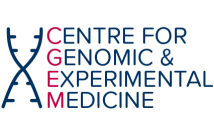Feature: The many faces of Mairead Bermingham
January 2018: Mairead is a valued IGMM researcher, teacher, and advocate of public engagement.

Mairead is a versatile researcher, teacher, and she often represents the IGMM at public engagement events. Réka Nagy celebrates her achievements in this feature.
Mairead loves to do research. She is equally passionate about communicating her research finding to her colleagues, students, practitioners and the general public. Throughout last year, she was on the panel at the ‘Would you sequence your own genome?’ event at Broughton High. She additionally presented her work on rare craniofacial disorders, dental health as well as type 1 diabetes at the MRC Festival of Medical Research, IGMM Doors Open Day 2017, Explorathon – European Researchers’ Night and Dundee Science Festival. She also completed the Diabetes UK 1 million steps challenge, raising £77 for diabetes research.
While not officially part of her job description, Mairead continues to do public engagement because she sees this as an opportunity to start a dialogue with the public. As a consequence, her work is constantly improved by the suggestions she receives. One tangible outcome of her efforts is a paper she is about to publish detailing the results of her survey on public willingness to participate in orofacial genetic research.
In 2016, she completed the Postgraduate Certificate Academic Practice and subsequently became a fellow of the Higher Education Academy. Thanks to this, she now teaches on the Public Health MSc programme in addition to providing tutoring support. Together with her on-going volunteering, these experiences have enhanced her ability to translate her science to audiences ranging from children to senior researchers.
Mairead has been at the IGMM, within CGEM, since 2012 and her work has taken her on an exciting tour of the genetics of human health and disease; including oral health, craniofacial disorders, healthy ageing, major depressive disorder, type 1 diabetes and cardiovascular disease.
While embarking on each new project has had its challenges, Mairead’s experiences have taught her that every obstacle one meets in research is surmountable. As a consequence, she remains unfazed in the face of new challenges.
In the long term, Mairead intends to set up her own research group focusing on orofacial genetic research. Edinburgh is the right place to do this, as she can tap into the established infrastructure in health informatics across the Edinburgh Dental Institute (EDI), IGMM and Usher Institute. For instance, Mairead has recently used this infrastructure to lead the linkage of electronic dental records to demographic, environmental, lifestyle, health and genetic data in the Generation Scotland: Scottish Family Health Study (GS:SFHS), and established the heritable nature of periodontal (gum) disease within the cohort.
Mairead would like to especially like thank her mentors, line managers and colleagues across the EDI, IGMM, Centre for Cognitive Ageing and Cognitive Epidemiology, Usher Institute and Roslin Institute for their continued support and guidance.


